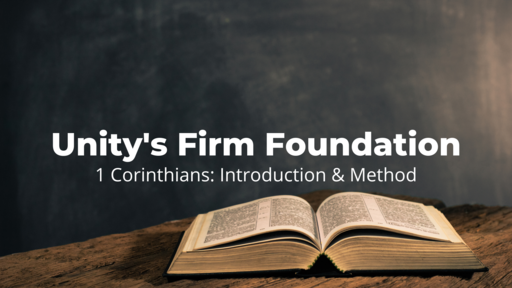Unity's Firm Foundation - 1 Corinthians intro & method

"To apply a verse or passage we must first know what it means. The foundation upon which unity rests is the Word of God. There can be no unity if God’s Word is not handled accurately."
Introduction
1. What Is 1 Corinthians?
a. A letter to the church 1:2
The city itself was really three cities: the port of Cenchrea, about eight miles to the east, where ships from the Aegean would unload; the port of Lechaeum, about a mile to the west on the Gulf of Corinth, where the ships would be reloaded, their goods having been transported in wagons over the isthmus and the ships on rollers; and the city itself on the high ground in between.
As in most Roman cities, marble temples dominated the landscape. The city was supplied with water from an underground well. It became a cosmopolitan city attracting tradespeople from all over the world, though its reputation grew simultaneously as a center of luxury, indulgence, and vice. A large colony of displaced Jews (part of the Diaspora) developed in the city, the group that undoubtedly attracted the apostle Paul.
Excavations have also shown that Corinth and its surrounding area were home to dozens of temples and shrines dedicated to such diverse deities as Apollo, Athena, Aphrodite, Demeter and Kore, Palaimon, and Sisyphus, as well as the Egyptian deities Isis and Sarapis. The Isthmian games focused their attention on a temple dedicated to Poseidon.
